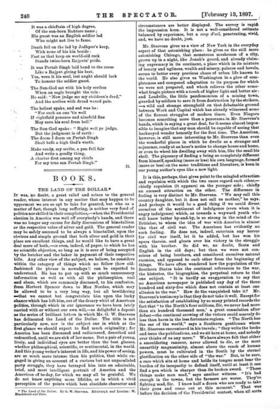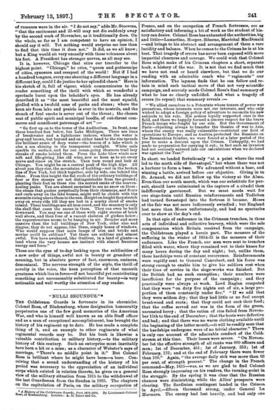BOOKS.
THE LAND OF THE DOLLAR.*
IT was, no doubt, a great relief and solace to the general reader, whose interest in any matter that may happen to be -uppermost we are so apt to take for granted, but who as a matter of fact, though long suffering, is neither very fond of politics nor skilled in their complicities,—when the Presidential election in America was well off everybody's hands, and there was no longer any excuse for daily discussions of bimetallism or the respective value of silver and gold. The general reader may be safely assumed to be always a bimetallist, upon the obvious and simple ground that both silver and gold in their place are excellent things, and he would like to have a great deal more of both,—or even, indeed, of paper, to which he has no scientific objection, so long as it is sure of being accepted by the butcher and the baker in payment of their respective bills. Any other view of the subject, we believe, he considers within the category of things which no fellow (how old- fashioned the phrase is nowadays !) can be expected to understand. He has to put up with so much unnecessary information as well as with all the philosophies, real and sham, which are commonly discussed, to his confusion, from Herbert Spencer down to Max Norden, which may be allowed to be a very long way, but all bewildering -.that we cannot but congratulate him upon the lucky chance which has left him, out of the dreary whirl of American politics, through which in our ignorance we have been lately carried with or without our own will,—so delightful a deposit as the series of brilliant letters in which Mr. G. W. Steevens has delineated the Land of the Dollar. The title is not particularly new, nor is the subject one in which at the first glance we should expect to find much originality ; for America has been discussed and rediscussed, described and redescribed, until we are sick of her name. But a pair of young, lively, and individual eyes are better than the best glasses, whether philosophical, scientific, or sentimental, in the world. And this young writer's interest in life, and his power of seeing, are so much more intense than his politics, that while en- gaged in giving an account of a curious but not unparalleled party struggle, they have betrayed him into an admirable, brief, and most intelligent portrait of America and the American of to-day, for which we may all be gratefuL We do not know anything more lifelike, or in which a vivid perception of the points which best elucidate character and • The Land of tits Dollar. By G. W. Steevena. Edinbarah and London: W. Blackwood and Cons.
circumstances are better displayed. The survey is rapid, the impression keen. It is not a well-considered estimate balanced by experience, but a coup d'ceil, penetrating, vivid, and, we have no doubt, just.
Mr. Steevens gives us a view of New York in the everyday aspect of that astonishing place : he gives us the still more astonishing Chicago, that monstrous mushroom of a city, grown up in a night, like Jonah's gourd, and already claim- ing supremacy in its continent, a place which in its mixture of beauty and ugliness, wealth and misery, palaces and hovels, seems to better every previous chaos of urban life known to the world. He also gives us Washington in a glow of com- pleteness and composed adaptation to its purpose for which we were not prepared, and which relieves the other some- what tragic picture with a touch of higher light and better air : and Leadville, the little pandemonium of a mining town, guarded by soldiers to save it from destruction by the strikers, —a wild and strange stronghold on that debateable ground between Work and Capital which has already witnessed some of the fiercest struggles of modern times. Even Niagara becomes something more than a panorama in Mr. Steevens'a hands, which is saying a great deal, for it seems almost impos- sible to imagine that any man should be capable of seeing that hackneyed wonder honestly for the first time. The American, however, is still more interesting to Mr. Steevens than even the wonderful places in which he dwells as a stranger and sojourner, ready at an hour's notice to change house and home, or even to wheel his dwelling away with him, like the snail his shell. The piquancy of finding a being so completely different from himself, speaking (more or less) his own language, formed (more or less) on the same traditions and literature, is keen in our young author's eyes like a new light.
It is this, perhaps, that gives point to the mingled attraction. and repulsion with which the two races regard each other,— chiefly repulsion (it appears) on the younger side ; chiefly. an amused attraction on the other. The difference in feeling is very distinct to Mr. Steevens. "We may call thia country daughter, but it does not call us mother," he says. And perhaps it would be a good thing if we could divest ourselves of the sentiment of indulgence (even when it is. angry indulgence) which, as towards a wayward youth who will know better by-and-by, is so strong in the mind of the Britisher, to whom the idea of war with America is almost like that of civil war. The American has evidently no such feeling. He does not, indeed, entertain any horror for civil war itself, let it be added, but has won his spurs therein, and gloats over his victory in the struggle with his brother. So did we, no doubt, Scots and English in the old days ; but then we were not con- scious of being brothers, and considered ourselves natural enemies, and opposed to each other from the beginning of things. We have often wondered how the population of the- Southern States take the continual references to the war, the histories, the biographies, the perpetual return to that one subject. "It is hardly an exaggeration to say that no American newspaper is published any day of the three- hundred and sixty-five which does not contain at least one allusion to the war." How do the vanquished take it? Mr.. Steevens's testimony is that they do not take it well. Except for the satisfaction of establishing by so many printed records the fact that "to the North's four millions, Sir, we never had more- than six hundred thousand men,' a great consolation after- defeat—the continual crowing of the victors could scarcely do lessthan harm in the less fortunate regions. "The North has the ear of the world," says a Southern gentleman whom Mr. Steevens encountered in his travels ; "they write the books and issue the publications, and we sit here at home, and nobody ever thinks of us any more." We have always felt that either a smouldering rancour, never allowed to die, or the most unearthly magnanimity, almost above the reach of human powers, must be cultivated in the South by the eternal glorification on the other side of "the war." But, to be sure, a race which sits at home and holds its tongue must bear the burden of its incapacity to defend itself, until at least it can find a pen which is sharper than its broken sword. "These things make men mad," says another witness. "It's bad enough in the towns, but the farmers are worse. They're fighting mad, Sir. I know half a. dozen who are ready to take their guns and come out at this moment." That was before the decision of the Presidential contest, when all sorts of rumours were in the air. "I do not say," adds Mr. Steevens, "that the excitement and ill-will may not die suddenly away by the second week of November, as it traditionally does. On the whole, so far as I am competent to have an opinion, I should say it will. Yet nothing would surprise me less than to find that this time it does not." It did, as we all know; but a King would sit very uneasily with these volcanoes about his feet. A President has stronger nerves, as all may see.
It is, however, Chicago that stirs our traveller to the highest point. "Chicago," he cries, "queen and guttersnipe of cities, cynosure and cesspool of the world ! Not if I had a hundred tongues, every one shouting a different language in a different key, could I do justice to her splendid chaos." Here is his sketch of it, full of vigour, which communicates to the reader something of the thrill with which so wonderful a spectacle burst upon the beholder's eyes. He has already described it as "the most beautiful and the most squalid, girdled with a twofold zone of parks and slums ; where the keen air from lake and prairie is ever in the nostrils, and the stench of foul smoke is never out of the throat ; the chosen seat of public spirit and municipal boodle, of cut-throat com- merce and munificent patronage of art "
:- "Go first up on to the tower of the Auditorium. In front, near three hundred feet below, lies Lake Michigan. There are lines of breakwater and a lighthouse inshore, where the water is grey and brown, but beyond and on either hand to the rim spreads the brilliant azure of deep water—the bosom of a lake which is also a sea shining in the transparent sunlight. White sails speckle its surface, and far out ocean-going steamers trail lazy streaks of smoke behind them. From the Lake blow winds now soft and life-giving like old wine, now so keen as to set every nerve and sinew on the stretch. Then turn round and look at Chicago. You might be on a central peak of the high Alps. All about you they rise, the mountains of building—not in the broken line of New York, but thick together, side by side, one behind the other. From this height the flat roofs of the ordinary buildings of four or five storeys are not distinguishable from the ground; planting their feet on these rise the serried ranks of the heaven- scaling peaks. You are almost surprised to see no snow on them : the steam that gushes perpetually from their chimneys, and floats and curls away on the lake breeze, might well be clouds with the summits rising above them to the sun. Height on height they stretch away on every side till they are lost in a murky cloud of smoke inland. These buildings are all iron-cored, and the masonry is only the shell that cases the rooms in them. They can even be built downward. You may see one of them with eight stories of brick wall above, and then four of a vacant skeleton of girders below ; the superstructure seems to be hanging in air. Broader and more massive than the tall buildings of New York, older also and dingier, they do not appear, like them, simply boxes of windows. Who would suppose that mere lumps of iron and bricks and mortar could be sublime ? Yet these are sublime and almost awful. You have awakened, like Gulliver, in a land of giants—a land where the very houses are instinct with almost ferocious energy and force."
These are the eyes of to-day looking upon the sublimities of a new order of things, awful not in beauty or grandeur of meaning, but in absolute power of fact, enormous, ominous, demoniacal. The nervous strength of the style, the thrill of novelty in the voice, the keen perception of that uncouth greatness which lies in force—if not beautiful yet contributing something not unreasonably substituted for beauty—is very
noticeable and well worthy the attention of any reader.



































 Previous page
Previous page